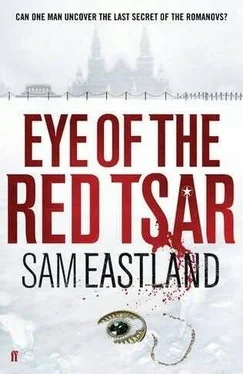“I regret that I have not.”
“Then I am guessing this has something to do with the Romanovs.”
“That is correct.”
“Of course it is. After all, what else would bring you to this backwater?”
“To tell you the truth, I am compelled by circumstance-”
“We are all compelled by circumstance,” interrupted Sister Ania. “I believe I can save you the trouble of wearing me down with your interrogation techniques.”
“Sister Ania, that is not what I…”
Her hand rose from her lap, then settled slowly back again. “I have waited a long time to tell what I know to someone I feel I can trust. He spoke of you, you know, in those few moments when we were able to talk. ‘If only the Emerald Eye were here,’ he would say.”
Pekkala felt a weight settle on him, like chains draped around his neck. “Did he really believe I could have helped him, under arrest and surrounded by armed guards?”
“Oh, no,” replied Sister Ania. “But I think his world just made more sense when you were in it.”
“I should have stayed,” muttered Pekkala, more to himself than to the nun.
“And why didn’t you?”
“He ordered me to leave.”
“Then you should have no regrets.”
Pekkala nodded, the chains so heavy on his shoulders that he could barely draw breath into his lungs.
“When the Tsar spoke of you, I realized that he had created in the Emerald Eye an image of himself as he would have wished to be but never could.”
“And how is that?” asked Pekkala.
“A man who had no need of things which he himself had found he could not live without.”
“Yes,” agreed Pekkala. “I believe there is some truth to that.”
Sister Ania sighed heavily. “Anyway, what does it matter now, except to old believers like ourselves? He is gone now, and you will hear many stories in this town about the night the Romanovs disappeared.”
“I have heard some of them already.”
“There are almost as many versions as there are people in Sverdlovsk. I cannot vouch for all of them, but what I can tell you is that the Romanovs had reason to believe they would be rescued.”
“Rescued? Do you mean by the Whites?”
“No. The Tsar knew that if the Whites came close enough to this town, the Reds would simply execute him and his family. This rescue was to take place before then. A plan had been worked out.”
“May I ask how you knew about it?”
“I brought them messages.”
“And you had written them?”
“Oh, no. I only delivered the messages.”
“Then who did they come from?”
“A former officer in the army of the Tsar asked me if I could get a message through to the Romanovs. This was in the early days of their captivity at the Ipatiev house, when the militia were still guarding them. The officer told me that a group of loyal soldiers were prepared to storm the house and transport the whole family to safety.”
“And you agreed?”
She nodded sharply. “I did.”
“So I can assume that your loyalties were also with the Tsar.”
“Let us say that this eviction notice from the Ural Soviet does not come as a complete surprise. I offered to deliver the messages myself, so that no one else in the convent need know about them.”
“How were they delivered?”
“Rolled up and hidden inside corks which were used to plug bottles of milk.”
“How did the Tsar reply?” asked Pekkala. “Were his messages also hidden in corks?”
“No, it was not possible to remove the messages without damaging the corks. The Tsar came up with his own method. It was quite ingenious. He used books. They were given to me as gifts, but I passed them along to the officer.”
“And these books contained messages?”
“None that the militia guards could find. I wasn’t even sure myself how the messages were getting through. There were no pieces of paper tucked inside or notes written into the margins. It was only after the Romanovs disappeared that the officer explained how the messages had been hidden.”
“And how was it done?”
“The Tsar used a pin”-she pinched the air in front of her-“making tiny holes beneath letters to spell out words. He always began on page ten.”
“And did the officer ever speak to you about these messages?”
“Oh, yes. He even offered to take me away with him when the Romanovs were rescued. But he never got the chance.”
“Why not?”
“At first, the Tsar wrote back that he was willing to be rescued, but only if the whole family could be brought away. Alexei was ill. The Tsar worried that the boy might be too weak to make an extended journey. He was anxious to avoid any bloodshed, even among the militia who were guarding him.”
“What happened to change his mind?”
“Shortly after the local militia were replaced by the Cheka security detachment, the Tsar sent a message ordering the officer not to attempt a rescue.”
“Why would the Tsar do that,” asked Pekkala, “when it was his only chance of escape?”
“That I cannot tell you,” Sister Ania said. “The officer said it would be too dangerous for me to know, since he could no longer guarantee my safety.”
“Did you ever see this officer again?”
“Oh, yes,” she replied. “We are still friends, he and I.”
“Sister Ania, it is important that I speak to this man, whoever he is.”
She looked at him carefully. “If that officer were here beside me now, he would say I had already told you too much.”
“I am not here to find a man who tried to save the Tsar,” said Pekkala. “I am here to find the one who put a bullet in his chest.”
Her lips twitched. “So it is true what the papers said.” It was not a question.
“Yes,” said Pekkala. “The Tsar is dead.”
She sighed heavily. “There are many who believed that he survived.”
“It is possible, however, that one of the children has survived.”
Sister Ania’s eyes widened. “Possible? What does that mean? Please, Inspector-is one of them alive or not?”
“That is what I am investigating, Sister Ania. It is why I am speaking to you now.”
“Which one?” she insisted. “Which child?”
“Alexei.”
She struggled to remain composed. “That poor boy… He had already endured so much.”
“Yes.”
Suddenly she leaned towards him. “And what do you believe, Inspector Pekkala?”
“My investigation is not yet complete.”
“No!” She slapped one hand against her knee. “What do you believe? Do you think he is alive or not?”
“I think he might be, yes.” His voice barely rose above a whisper. “And if there is any chance that the Tsarevich is alive, I think your officer might help me to locate him.”
“You will find him at the police station,” said Sister Ania, without hesitation.
“He is under arrest?”
“On the contrary,” she said. “He is in charge of the place. His name is Officer Kropotkin.”
“Kropotkin. This will not be my first conversation with the police chief.”
“That is just as well,” she replied. “He does not make a good first impression.”
Sister Ania walked Pekkala back towards the entrance.
As Pekkala passed by the crates filled with the belongings of the convent, he wondered in what dark warehouse they would be locked away and, if they ever saw the light of day again, what would be remembered of their owners and what convenient lies would be admitted.
Before they stepped from the cool shade of the building into the glare of the gravel courtyard, Sister Ania rested her hand on his shoulder. “If the Tsarevich is alive, promise me you will see to it that no harm comes to him, Inspector. He has suffered enough for crimes he did not commit.”
Читать дальше










